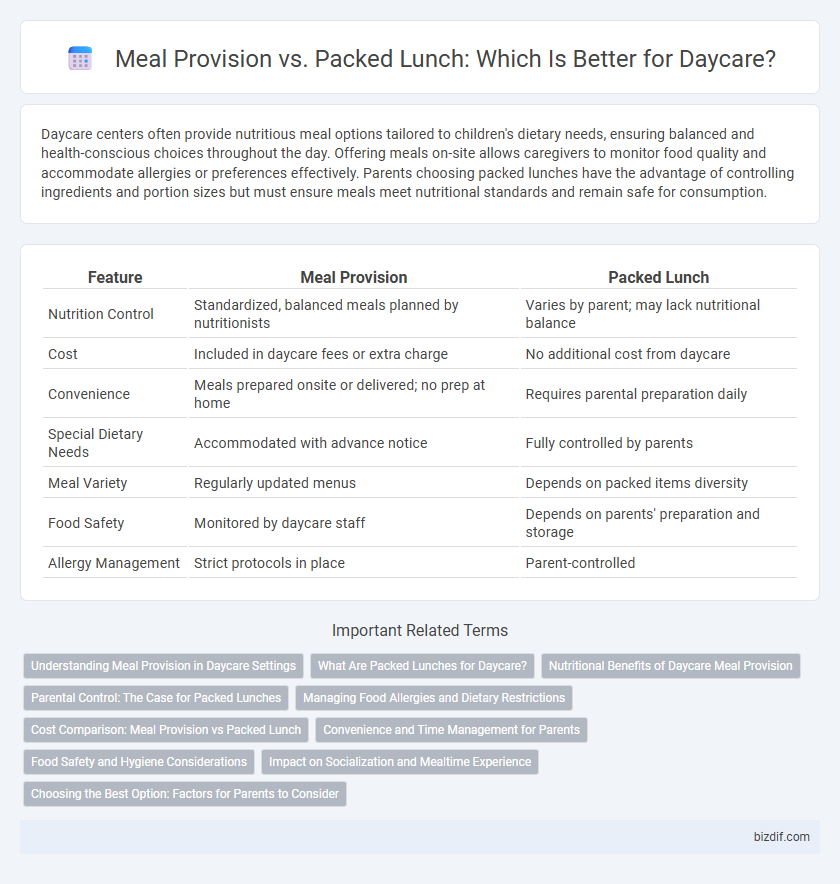Daycare centers often provide nutritious meal options tailored to children's dietary needs, ensuring balanced and health-conscious choices throughout the day. Offering meals on-site allows caregivers to monitor food quality and accommodate allergies or preferences effectively. Parents choosing packed lunches have the advantage of controlling ingredients and portion sizes but must ensure meals meet nutritional standards and remain safe for consumption.
Table of Comparison
| Feature | Meal Provision | Packed Lunch |
|---|---|---|
| Nutrition Control | Standardized, balanced meals planned by nutritionists | Varies by parent; may lack nutritional balance |
| Cost | Included in daycare fees or extra charge | No additional cost from daycare |
| Convenience | Meals prepared onsite or delivered; no prep at home | Requires parental preparation daily |
| Special Dietary Needs | Accommodated with advance notice | Fully controlled by parents |
| Meal Variety | Regularly updated menus | Depends on packed items diversity |
| Food Safety | Monitored by daycare staff | Depends on parents' preparation and storage |
| Allergy Management | Strict protocols in place | Parent-controlled |
Understanding Meal Provision in Daycare Settings
Meal provision in daycare settings involves offering nutritious, balanced meals prepared according to dietary guidelines to support children's growth and development. Many daycares follow strict food safety standards and accommodate allergies or specific dietary needs, ensuring all children receive appropriate nourishment. Understanding the benefits of meal provision versus packed lunches helps caregivers make informed decisions that promote healthy eating habits in early childhood.
What Are Packed Lunches for Daycare?
Packed lunches for daycare typically consist of meals prepared at home and brought by parents, ensuring customized nutrition based on the child's dietary needs and preferences. These lunches often include portion-controlled servings of fruits, vegetables, proteins, and grains, helping maintain balanced energy levels throughout the daycare day. Choosing packed lunches allows parents to manage allergens and provide familiar foods, promoting comfort and healthy eating habits for their children.
Nutritional Benefits of Daycare Meal Provision
Daycare meal provision offers balanced, nutritionally planned meals tailored to age-specific dietary needs, ensuring consistent intake of essential vitamins and minerals. Unlike packed lunches, these meals undergo regular quality checks and are designed by certified nutritionists to support healthy growth and immune function. This structured approach reduces the risk of inadequate nutrient consumption common with variable homemade meals.
Parental Control: The Case for Packed Lunches
Packed lunches offer parents greater control over their child's nutrition, allowing them to tailor meals to specific dietary needs and preferences, including allergies or cultural restrictions. This method ensures transparency and confidence in ingredient quality, which can be difficult to guarantee with daycare meal provision services. Parental involvement in meal preparation fosters healthier eating habits and reinforces dietary consistency between home and daycare environments.
Managing Food Allergies and Dietary Restrictions
Daycare centers prioritize managing food allergies and dietary restrictions by offering controlled meal provision, ensuring meals are prepared with strict allergen protocols and balanced nutrition. Packed lunches can introduce risks due to hidden allergens or cross-contamination, complicating allergy management for staff. Structured meal programs help maintain consistent dietary standards and safeguard children's health effectively.
Cost Comparison: Meal Provision vs Packed Lunch
Meal provision at daycare centers typically incurs a fixed daily fee ranging from $4 to $7, covering balanced, nutritionally planned menus that meet childcare regulations. Packed lunches, while offering flexibility and potential cost savings, often result in variable expenses due to parental shopping habits and may lack nutritional consistency, potentially increasing health-related costs over time. Evaluating total expenses, including food quality and preparation time, highlights that meal provision generally offers better cost-efficiency and nutrition assurance compared to the unpredictability of packed lunches.
Convenience and Time Management for Parents
Daycare centers offering meal provision streamline daily routines by eliminating the need for parents to prepare and pack lunches, significantly saving time during busy mornings. This service ensures balanced, nutritious meals prepared to meet dietary guidelines, reducing parental stress about food choices. Opting for daycare meals enhances convenience and allows parents to focus on work commitments without worrying about meal logistics.
Food Safety and Hygiene Considerations
Daycare centers must prioritize stringent food safety standards when providing meals, ensuring proper storage, preparation, and serving temperatures to prevent contamination and foodborne illnesses. Packed lunches require strict guidelines for parents, including the use of insulated containers and non-perishable items to maintain hygiene and freshness throughout the day. Regular staff training on cross-contamination prevention, allergen management, and hand hygiene is essential to uphold a safe and healthy eating environment for children.
Impact on Socialization and Mealtime Experience
Daycare meal provision encourages children to eat together, fostering socialization and the development of communal eating habits. Shared mealtime experiences during daycare meals promote communication skills, cooperation, and a sense of belonging. In contrast, packed lunches can create isolated eating moments, limiting interaction and reducing opportunities for social learning during meal times.
Choosing the Best Option: Factors for Parents to Consider
Parents should evaluate nutrition quality, convenience, allergies, and cost when deciding between daycare meal provision and packed lunches. Daycare meal programs often follow strict dietary guidelines ensuring balanced meals, while packed lunches provide control over ingredients and portion sizes. Considering the child's preferences, daycare policies, and time management can help parents choose the healthiest and most practical option.
Meal Provision vs Packed Lunch Infographic

 bizdif.com
bizdif.com